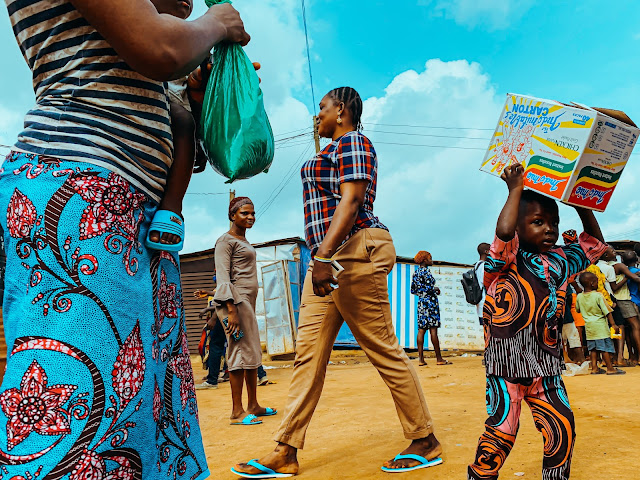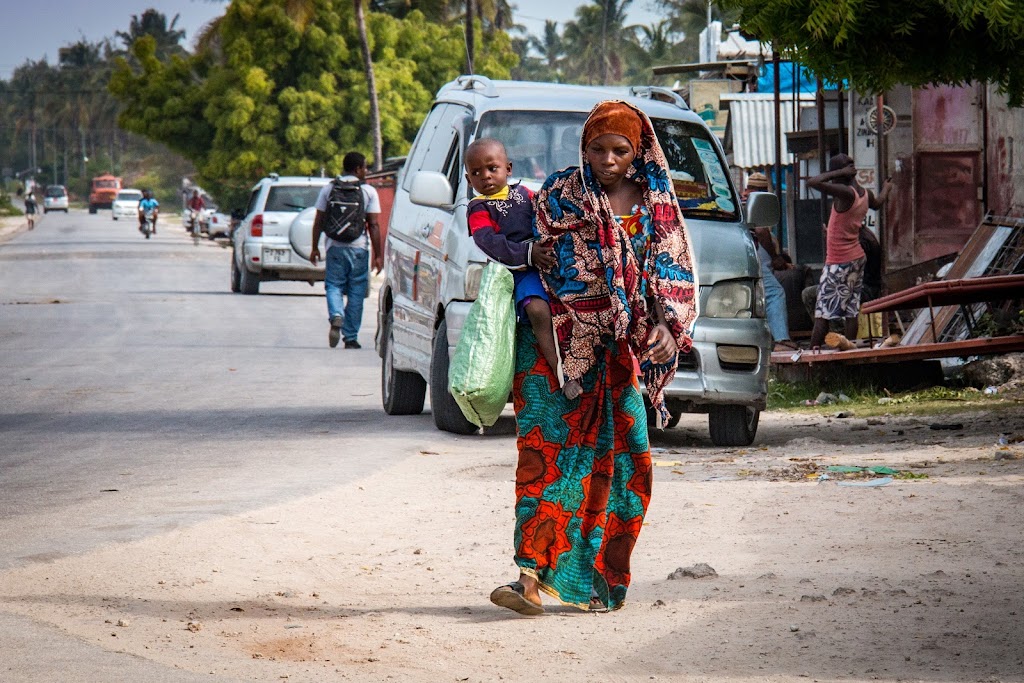Lessons for African Youth: Education is Empowerment

Education is often described as the key to unlocking your potential, and for young Africans, this lesson is a fundamental truth.
Learning for Peace

Imagine a world not too distant from our own, where the shadows of conflict cast a pall over communities. Amid this turbulence,
The Women of Sunny Street

It is that time of the month again. My mum has already collected the donations from each person in our street. My mum and our next-door neighbor had gone to the market a day before to get food items, clothing, and other things to give back to the community. This usually made me happy.
Lessons for African Youth: Preserve Indigenous Knowledge

Lesson 2: Preserve Indigenous Knowledge A major lesson for young African youth is a call to preserve and cherish indigenous knowledge. Embedded within the customs, rituals, and wisdom of Africa’s diverse communities is a wealth of insights and understanding that have sustained societies for centuries. Indigenous knowledge encompasses a wide spectrum of expertise, from traditional medicine and agricultural practices to storytelling and craftsmanship. It is the accumulated wisdom of generations who have learned to thrive in Africa’s varied ecosystems, adapting to its challenges and harnessing its resources. Preserving indigenous knowledge is an act of cultural preservation, ensuring that the unique heritage of each African community endures. But it goes beyond that: it is also about recognizing the value of this knowledge in addressing contemporary issues. Where climate change, food security, and healthcare are pressing concerns, indigenous knowledge can provide innovative solutions. It offers alternative approaches to sustainable agriculture, holistic healthcare, and environmental stewardship that have been refined over centuries. For young Africans, this lesson carries a profound responsibility. It is an invitation to engage with your elders, to learn from them, and to document their knowledge for future generations. It is a recognition that while modern education is crucial, it should complement rather than replace the wisdom embedded in African traditions. Moreover, preserving indigenous knowledge is not just a matter of nostalgia: it is about empowering communities to take ownership of their development. It is about bridging the gap between tradition and progress, recognizing that both have a role to play in shaping Africa’s future. The lessons outlined here are not merely suggestions but a blueprint for the empowerment and transformation of young African youth. At Shades of Us, these lessons are not just principles: they are at the core of our mission. By embracing these lessons, young Africans become the protagonists of their narratives. Lesson 1: Embrace Cultural Diversity
Friendship

Friendship is the universal bond that links souls together. We share why friendships matter in this podcast.
Mental Health Services in the Workplace

The success of an organization depends critically on the mental health of its workforce in the fast-paced, high-pressure work settings of today. Employers are realizing more and more how important it is to help employees with workplace mental health services and address mental health issues. Employers and employees alike must comprehend how these services contribute to a productive workplace and increase employee satisfaction. A variety of tools and support systems are included in workplace mental health services, which aim to improve mental health and deal with mental health issues. Employee assistance programs (EAPs), counseling services, training on mental health awareness, and access to mental health professionals are a few examples of these services. Employers show their dedication to promoting the overall health of their staff by providing these resources. One of the primary benefits of implementing mental health services in the workplace is the positive impact on employee productivity. An individual’s capacity to do their work well can be severely hampered by mental health conditions like stress, anxiety, and depression. Employers can assist staff members in managing mental health concerns and stop them from developing into more significant problems that could lead to absence or decreased productivity by giving timely access to mental health support. In addition, mental health services help foster an inclusive and encouraging work atmosphere where staff members feel appreciated and taken care of. Employee motivation, engagement, and commitment to their work are likely to increase when they are aware that their employer places a high priority on their mental health. Consequently, this nurtures a constructive company culture defined by respect, cooperation, and trust. Investments in mental health services at work also have the important side effect of lowering absenteeism. Workers frequently take time off work to deal with symptoms or seek treatment for mental health concerns, which are a major cause of absenteeism. Employers may assist employees in effectively managing their mental health concerns and lessen the need for prolonged absences by addressing mental health issues early on and offering easily available support services. Additionally, workplace mental health services are essential for de-stigmatizing mental illness and encouraging candid conversations about mental health concerns. Employers can foster a culture of acceptance and understanding where employees feel comfortable seeking help when required by educating staff members and increasing awareness of mental health issues. This helps break down societal obstacles related to mental health, in addition to benefiting individual employees. Incorporating mental health services into the workplace requires a holistic approach that considers the unique needs and challenges of employees. Employers can collaborate with mental health professionals to develop tailored programs and initiatives that address specific concerns within the organization. This may involve offering confidential counseling services, organizing mental health workshops and seminars, or providing access to digital mental health platforms for remote employees. Shades of Us Storytelling for African People aligns with the importance of mental health services in the workplace. By amplifying diverse voices and experiences, it acknowledges the unique challenges faced by individuals of African descent in navigating mental health issues within work environments. Promoting workplace well-being through accessible and culturally sensitive mental health support resonates with our commitment to holistic storytelling and community empowerment. It is impossible to overestimate the importance of mental health services for workplace wellbeing. Employers have to put their workers’ mental health first and foster conditions that encourage resilience and flourishing. Employers who invest in mental health services see increased productivity, lower absenteeism, and the development of a compassionate and empathic work environment.
Sanitation Superheroes

There exists a unique league of heroes we are going to call the ‘Sanitation Superheroes’. These extraordinary individuals don’t wear capes or possess superhuman strength, but they play a vital role in safeguarding our health, our communities, and our environment through their unwavering commitment to sanitation and cleanliness. The Sanitation Superheroes are the dedicated sanitation workers who toil tirelessly to ensure our waste is collected and disposed of safely. They are the janitors and custodians who keep our schools and workplaces clean and hygienic. They are the environmentalists and activists who fight against pollution and promote sustainable sanitation practices. These unsung heroes work quietly and diligently behind the scenes, making the world a healthier and more livable place. Sanitation Superheroes have diverse roles and responsibilities that revolve around the principles of cleanliness, hygiene, and waste management. Some of their key functions include: Waste Collection: Sanitation workers are the backbone of waste collection systems. They pick up trash from homes, streets, and businesses, preventing the spread of disease and maintaining the aesthetics of our neighborhoods. Cleaning and Disinfection: Janitors and custodians play a crucial role in maintaining the cleanliness of public spaces. They sanitize surfaces, and empty trash bins, and ensure that public areas are safe and hygienic. Environmental Stewardship: Environmental activists and organizations work tirelessly to protect natural water sources, reduce pollution, and promote sustainable sanitation practices. They advocate for clean rivers, oceans, and air. Education and Advocacy: Sanitation Superheroes often engage in community education and advocacy efforts to raise awareness about the importance of proper sanitation. They teach people about waste reduction, recycling, and responsible water use. Emergency Response: During natural disasters and public health emergencies, sanitation workers are on the front lines, helping to maintain sanitation and prevent the outbreak of diseases. The work of Sanitation Superheroes is indispensable to our society and the environment for several reasons: Health and Hygiene: Proper sanitation practices are fundamental to public health. Sanitation workers and custodians prevent the spread of diseases by maintaining clean and safe environments. Environmental Protection: Environmental activists and organisations champion the cause of protecting natural resources. Their efforts help ensure clean water, air, and land for future generations. Community Well-being: Clean and well-maintained public spaces contribute to a sense of community pride and well-being. This positively affects the quality of life for all residents. Disaster Resilience: In times of crisis, sanitation workers are essential for maintaining order and preventing secondary disasters related to sanitation breakdowns. Sustainable Future: Advocates for sustainable sanitation practices help mitigate the environmental impact of waste and promote a more sustainable and eco-friendly future. Sanitation Superheroes may not have the glamour of traditional superheroes, but their contributions to society are immeasurable. They safeguard our health, protect our environment, and ensure the cleanliness and hygiene of our communities. Their dedication and selfless service are reminders that heroism comes in many forms, and sometimes, it’s the unsung heroes who make the greatest impact on our lives. We at Shades of Us urge everyone to recognize and celebrate the work of Sanitation Superheroes and strive to support their efforts in creating a cleaner, healthier, and more sustainable world for all.
Unclean

My eyes fly open courtesy of the sharp pain shooting through my lower abdomen and instant panic grips my heart. Please let it not be what I think it is. It is way too soon: I am not ready. “Do not be it. Do not be it. Do not be it.” I whisper to myself like the words can change anything. I look down to check my undercloth and instant relief floods my heart. It is not my menstrual period. Hopefully, this sharp pain in my stomach is just indigestion and not a sign that my period is about to start. Looking out of the window, I see it is getting bright outside. I should start getting ready for church. I love Sundays, not because of the going to church part but because I get to sleep in. Every other day, I have to wake up early to fetch water from the stream before the sun comes up, clean up the house, and go for lessons. Sundays are the exception because according to Mama, “it is the Lord’s day and we ought to rest just as God did”. I get up and stretch my hands as high as they can go, then roll up the sleeping mat and place it in the corner of the room where I usually keep it. Is that a new crack in the wall? Oh well, it is one more crack to go with the millions of cracks that make up this rickety house. As I walk out of my room, I notice how quiet everywhere is: Mama has already left for church. I would hear her moving about if she were home. I head to the kitchen so I can take out some water from the drum. The drum is big enough for a child to drown in if they get stuck in it. I know this from personal experience: I nearly drowned when I climbed into it when I was younger. I can still remember the sound beating Mama gave me after she rescued me. The beating had the desired effect because I did not go near the drum for years after that. I remember believing Mama hated me for the longest time after that. Those were the times I wished for my parents the most. My parents died in a ghastly car accident when I was an infant so I have lived with Mama, my father’s mother, all my life. I do not know anything about my parents or the accident that took their lives. Mama never talks about either no matter how many times I ask. She always says I do not need to know more because she is my mother and father now. Sometimes, I feel she is sweet for that. Other times, I feel she is selfish for hoarding information about my parents. I fill up the bucket beside the drum and take it to the back of the house where the toilet is located. The water is cool to the touch but I do not let that bother me as I quickly freshen up and head back to my room. Squatting in front of my small pile of clothes neatly folded at the corner beside my mat, I pick a dress at random to wear. Mama has mentioned a billion times that I should put more care into how I dress for service but I really do not care about impressing anyone with what I wear. I make quick work of dressing up, pick up my Bible, and head to church. I always take a leisurely stroll to church because I love the sight of nature – the slight wind blowing the tree leaves, the occasional scurry of small animals across the path, the sound of wildlife, and the view of the spectacular sunrise. I have watched it since I was a little girl, up until now that I am the full old age of sixteen. It is all so beautiful and it never gets old. I wish I could stay here forever. Unfortunately, there is church service. I do not like church. It is filled with the hateful and judgemental people of our community who gossip from the start of service till the end. I can never tell Mama this though… she will think I have been possessed by an evil spirit and take me to the pastor for special prayers. To be fair, it is not just the church I do not like. I do not like the entire community, their small-mindedness and nonsensical traditions make me so angry. I hear raised voices singing hymns from the church and sigh, I hate that too. The church is less than a five minutes walk from our house so I get there quickly. I take a moment to stare at the church building like I always do. I should be used to it by now but I am not. It amazes me that such a standard building exists in this community. It is tall enough to tower over every other building in its vicinity with its grey walls and ever-clean window panes. I wonder how much money was sunk into it, money that could have gone into improving the community. I snap out of staring, take a deep breath, and head to the church entrance with an ingenuine smile on my face. I am already dreading the long hours I will be stuck here for. I enter the church and walk to the back with my head down to avoid having to make eye contact with any of the gossips. Why are the doors at the side of the building and not at the back? I know I ask this question in my mind every Sunday because it annoys me every Sunday. I finally get to the back. I sit in the last row of seats and watch the spectacle that we call a Sunday service. It starts with Sunday school which is taken by one of
Lessons For African Youth: Embrace Cultural Diversity

By Adetayo Adetokun Africa stands at a pivotal moment in its journey. With the largest youth population globally, the potential for transformative change is boundless. These young Africans are the torchbearers of their nations, poised to steer the continent toward a brighter, more prosperous future. Yet, this path forward is laden with challenges, ranging from economic disparities and political complexities to environmental concerns and cultural shifts. To navigate these turbulent waters, every young African youth must be armed with a profound set of lessons that not only equip them with knowledge but also nurture their character. Lesson 1: Embrace Cultural Diversity From the bustling markets of Marrakech to the serene savannas of the Serengeti, Africa’s diversity is its hallmark. To the young African youth, the first lesson is to wholeheartedly embrace this richness. Diversity is not just a matter of demographics: it is a treasure trove of ideas, perspectives, and experiences. Every culture contributes to the intricate fabric of African identity. Whether you hail from the Sahara or the Kalahari, the Nile or the Niger, your roots are intertwined with countless others. This diversity is a source of strength, resilience, and creativity. Diversity is not a threat but a source of enrichment. It is about appreciating the beauty of a continent where over 2,000 distinct languages are spoken, where rituals and ceremonies differ from village to village, and where cuisine can be as varied as the landscapes themselves. However, embracing cultural diversity is not merely a passive act of acceptance but an active engagement with the world around you. It means understanding the customs, traditions, and beliefs of your fellow Africans. It means listening to their stories, tasting their foods, and dancing to their rhythms. It means breaking down barriers and forging connections. This lesson lays the foundation for a more tolerant, inclusive, and harmonious society. Through embracing diversity, Africa can overcome historical divisions and conflicts, forging a united front to address the challenges of the 21st century.
Ripple Effects of Poverty: Child Marriage

Photo by Dick Scholten on Pexels by Grace Anaja Child marriage is a plague that affects millions of girls all around the world. The United Nations Children’s Fund (UNICEF) describes child marriage as ‘any formal marriage or informal union between a child under the age of 18 and an adult or another child.’ In developing countries like Niger, Nigeria, and Central African Republic, 36% of girls are married before age 18, and 10% are married before age 15. The Universal Declaration of Human Rights also states that marriage must be entered by individuals who are fully consenting and at full age. Child marriage is an outright violation of their rights, especially with girls: it prevents them from being educated and empowered, growing up with their peers, maturing in their own time, and ultimately choosing their own life partners when they want to. It hinders them from achieving their goals and potential. In most parts of the world, child marriage is mainly driven by poverty. Girls are said to be ‘expensive’ to raise. Parents from low-income and rural communities who do not understand the value of education and empowerment and still hold on to patriarchal beliefs do not regard girl child education. For some, an educated boy child is more valuable and worth their investment. Since they cannot afford school fees or materials in cases where free education is available, they marry the girls off as adolescents. To them, this reduces the number of ‘mouths to feed’. Out–of–school girls have a higher chance of becoming child brides. Marrying these girls to wealthy or comfortable men who, most of the time, are much, much older would mean less financial pressure on the family and an avenue for provision… a way out of lack. These girls have been turned to ‘Poverty Alleviation Projects’ for their families. Sometimes, the girls are indirectly forced to get married when their parents neglect them. They believe having a husband means they would be catered for and their needs would be met. Certain people believe that child marriage ensures a girl’s virginity and prevents promiscuity, unwanted pregnancies, and diseases. However, child marriage has many health risks for the girl child. These include sexually transmitted diseases like Human Immunodeficiency Virus (HIV) and Human Papilloma Virus (HPV), cervical cancer, miscarriages, death during childbirth, premature birth of offspring, obstetric fistula – which, according to the World Health Organisation, is an abnormal opening between a woman’s genital tract and her urinary tract or rectum, and could lead to maternal mortality. It can be prevented by delaying the age of the first pregnancy. Child marriage is a form of gender-based violence that exposes young girls to various forms: physical, sexual, psychological, verbal, and socioeconomic violence. These child brides move from home after marriage and usually live in isolation, especially for those who move to a new location. The opportunity to grow, play, have friends, and build social skills is lost. Because the men that marry them are older, they have little to nothing in common and are only concerned about household responsibilities. They are thrust into wifely duties and motherhood so early that they barely know what they are doing. When they give birth, it is practically a child having a child. Due to their low level of education, they are concentrated in the service industries doing menial, nonessential and domestic work, with little possibility for a chance at more. It is said that if you educate a man, you educate an individual. But if you educate a woman, you educate a nation. When young girls cannot pursue education, it limits women’s potential to contribute to national development. It denies them access to opportunities, resources, and mainstream governance: benefits and responsibilities. It sustains the already established patriarchal system that so desperately needs to end. Child marriage does not end the vicious cycle of poverty. It only strengthens it. If poverty was eradicated or reduced, would families and societies place more value on girls and women?

